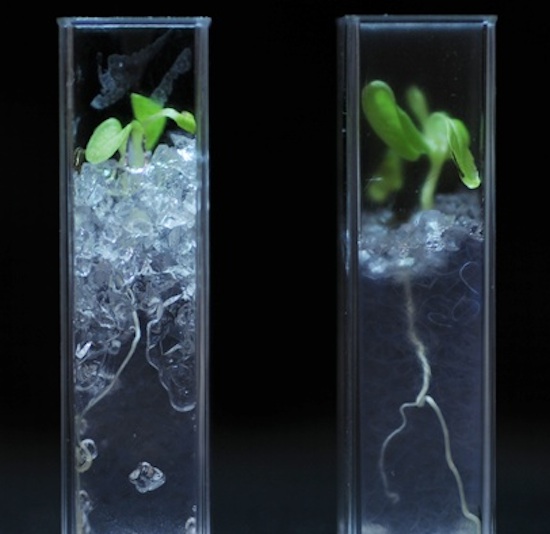Transparent Dirt Gives Soil Researchers Best Ever Look At Root Systems
Researchers have a new way to learn more about the rhizosphere — the system of plant roots that is constantly at work beneath our feet, anchoring, feeding and nurturing the planet’s plant life. Though roots are practically everywhere beneath us, science still has a lot of questions about how they work, as their underground placement and slow development can make root systems difficult to study accurately. That may be changing, though, as a new transparent soil substitute offers researchers a chance to watch root systems take shape in their (sort of) natural element for the first time ever.
The see-through soil isn’t dirt like we’re used to, but a substance called Nafion, most often as an energy conductor in fuel cells. Ground up and saturated in a water-based solution, though, Nafion becomes a transparent replacement for good ol’ dirt. Plants can’t seem to tell the difference, while researchers get to watch plants take root in real time, hopefully leading to a finer understanding of how they form and what — if any — logic the networks of fibers follow as they grow. They could also help agricultural scientists find out which breeds of plants have the most efficient root systems, and hopefully breed those traits for plants with roots that have desirable traits — thriving in poor soil, for example, or making the most of every drop of water they can find.
See-through soil could have implications for more than just watching roots grow, though. In a transparent Nafion medium, researchers could get finer looks at how soil bacteria — both pathogens and beneficial bacteria — move around on their home turf and learn more about how to direct benign bacteria and stop destructive ones. Among the first things on researchers to-do lists, though, is find ways to lower the cost of the see-through soil. That will be key to making it available to researchers in developing countries where experiments with the substance stand to do the most good.
(via PhysOrg)
- Think what we could learn from this vertical garden
- Plants are pretty neat, though, like when they have their own wasp guardians
- We want to know more about the sturdy roots of zombie-fighting plants, please
Have a tip we should know? [email protected]
